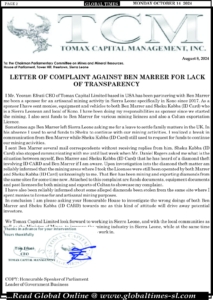By Terry Mante
In any enterprise setting, staff are anticipated to behave as ambassadors of the model and custodians of the corporate’s targets. Yet, there’s a rising variety of staff whose actions are something however aligned with their employer’s pursuits.
These people, whether or not pushed by private greed, frustration, or misguided opportunism, turn out to be harmful staff. They subtly—or overtly—undermine the enterprise, resulting in losses that may cripple the group over time.
A firsthand expertise of betrayal
My spouse and I had a firsthand expertise with one such harmful worker. We have been in a retailer at a mall in Accra, trying to buy an equipment. After asking in regards to the product’s specs, the salesperson, in a conspiratorial tone, stated, “If you want, I can get you this item at a better price elsewhere.” Here we have been, inside a widely known retail outlet, and the particular person entrusted with making gross sales for the shop was actively encouraging us to purchase the product from one other supply.
It was obvious that this salesperson was working a aspect hustle. His focus had shifted from serving his employer to pursuing private achieve—even when it meant the shop would lose a sale. This was not nearly poor salesmanship; it was about betrayal from inside.
The digital world isn’t immune
This habits isn’t remoted to conventional retail settings. I’ve encountered comparable tales within the digital world, notably with ride-sharing providers like Uber, Yango, and Bolt. Many drivers on these platforms, after being matched with a rider, supply to cancel the trip on the app and as an alternative perform the journey offline for money.
Their reasoning is easy: by bypassing the app, they keep away from paying the platform’s fee. These drivers might imagine they’re making a bit of additional cash on the aspect, however in actuality, they’re chipping away on the integrity of the system that allows their livelihood.
These drivers are an instance of harmful staff within the gig financial system. The platforms—Uber, Yango, Bolt—present the infrastructure, advertising, and buyer base that these drivers depend on to make a residing.
If each driver gamed the system in that method, these platforms would undergo important income loss, which might result in larger charges for all drivers, lowered providers, and even enterprise closure. And when that occurs, who will give these drivers entry to paying passengers?
Why do staff undermine their employers?
What drives staff to behave in opposition to the pursuits of the businesses that make use of them? The reply is complicated. For some, it might be dissatisfaction with wages or working situations.
Others might really feel that they don’t seem to be valued by the corporate, main them to justify unethical habits as a way of “leveling the playing field.” For some, it’s merely greed—a need to make a fast revenue with out contemplating the long-term penalties.
Regardless of the rationale, the end result is identical: when staff act in ways in which hurt their employer, they turn out to be harmful to the enterprise.
The far-reaching penalties of harmful staff
The affect of such habits is far-reaching. Dangerous staff don’t simply price companies cash; they harm reputations. In in the present day’s world, the place shopper critiques and scores are solely a click on away, one dishonest worker can tarnish the picture of a whole firm. A salesman who behaves unethically might trigger a buyer to lose confidence within the model, deciding by no means to return.
Safeguarding in opposition to harmful staff
How can companies safeguard themselves in opposition to these harmful staff? One reply lies in fostering a robust organizational tradition constructed on integrity, accountability, and shared values. When staff really feel a way of possession and belonging, they’re much less prone to interact in habits that undermines the corporate.
Transparency in regards to the firm’s monetary well being and its targets can even encourage staff to see how their work contributes to the bigger image. If an worker understands that each sale issues, or that fee charges go towards enhancing the platform they depend on, they’re extra prone to act within the firm’s finest curiosity.
The position of accountability and firm tradition
Furthermore, companies should have clear insurance policies and penalties for unethical habits. Employees ought to know that in the event that they interact in practices that harm the corporate, they’ll face repercussions. This might vary from retraining applications to termination, relying on the severity of the offense. It’s important to strike a steadiness between supporting staff and holding them accountable.
On the worker aspect, there must be a shift in mindset. Employees should acknowledge that their actions don’t simply have an effect on their employers—they have an effect on their very own futures as properly. An organization that loses income due to unethical worker habits is much less prone to spend money on employees improvement, raises, or bonuses.
In excessive circumstances, constant income loss might result in layoffs and even enterprise closure. By performing with integrity, staff aren’t solely defending their employers, but in addition securing their very own livelihoods.
Employees as companions, Not saboteurs
Dangerous staff are a menace to any enterprise. Whether it’s a retail employee directing prospects elsewhere or a driver bypassing platform guidelines, these people harm belief, income, and status.
Businesses should spend money on creating environments that promote loyalty and moral habits, whereas staff should perceive that their success is tied to the success of the corporate. Only by working collectively in alignment can each employer and worker thrive in in the present day’s aggressive enterprise panorama.
——Bottom of Form
About the writer
Terry Mante is a thought chief whose expression as an writer, company coach, administration guide, and speaker supplies problem and inspiration so as to add worth to organizations and place people to operate successfully. He is the Principal Consultant of Terry Mante Exchange (TMX). Connect with him on LinkedIn, Facebook, X, Instagram, Threads, and TikTok @terrymante and www.terrymante.org.













